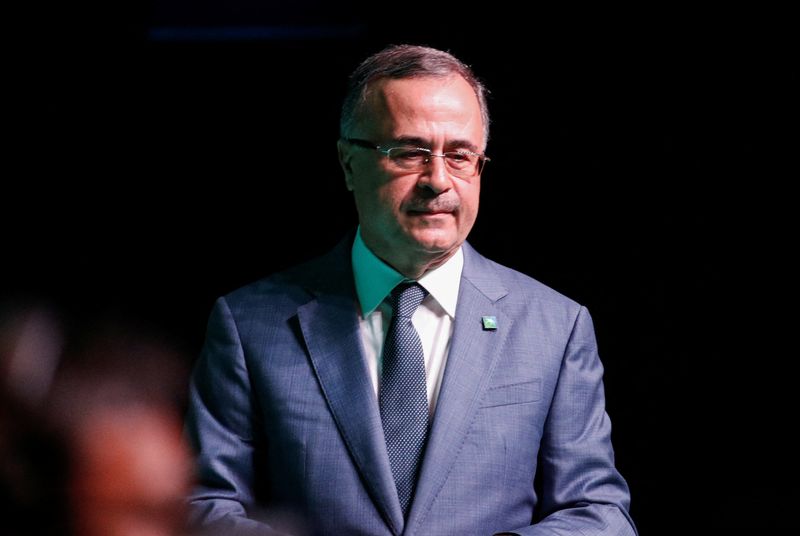(Corrects the title of Mazen Al-Sudairi in paragraph 21)
By Maha El Dahan and Michael Georgy
DUBAI (Reuters) – At an industry event in Riyadh two years ago, Saudi Arabia’s energy minister stopped in front of about 1,000 people at about 9 p.m. and told them it was bedtime for Amin Nasser, the CEO of a giant state-owned oil producer. Saudi Aramco (TADAWUL:).
He wasn’t kidding.
Over a career spanning forty years, Nasser has built a reputation for a style of dedication that means he will ensure he is ready for the challenges of the day ahead, rather than meddling into the early hours.
“It was a little bit embarrassing, you know, with protocols and all that stuff, but it shows his work ethic and everything he does to stand out,” said an industry source, speaking on condition of anonymity.
Nasser has been patiently preparing for years for orders to sell more shares in Aramco, after managing the company’s record $29.4 billion initial public offering in 2019.
The historic deal is a key part of Crown Prince Mohammed bin Salman’s push to diversify the economy away from oil. The Saudi oil giant is one of the most valuable companies in the world.
While dealing with the day-to-day management tasks of a company with more than 73,000 employees, Nasser has also dealt with the questions surrounding how to meet the world’s energy needs and has become increasingly outspoken on the issue.
ISLAND TECHNOCRAT
Under Nasser, Aramco has invested in refineries and petrochemical projects in China and elsewhere, expanded its retail and trading operations and sharpened its focus on gas, making its first foray into liquefied gas abroad last year.
Before becoming CEO in 2015, the homegrown technocrat was an unknown quantity in the West. Unlike other Aramco CEOs, he is not a product of a major American university and instead rose through the company’s ranks after receiving a Saudi education.
Nasser started his career as a petroleum engineer. Prior to becoming CEO, his positions included vice president of upstream when he led the company’s largest capital investment program across its integrated oil and gas portfolio.
To run the company smoothly, he must maintain the support of two of the most powerful figures in the kingdom: Energy Minister Prince Abdulaziz bin Salman and Yasir al-Rumayyan, governor of the Saudi sovereign wealth fund PIF, who is also chairman of the board of Aramco’s board. directors.
Nasser has become very popular at Aramco by promoting a decentralized culture and spending time with both leaders and employees, analysts say.
During the Muslim fasting month of Ramadan, he makes a point of visiting an Aramco field or factory every evening and breaking the fast with crews.
Pleasing the elite is also part of his job. That means the petrodollars must keep flowing, including for the ambitious economic diversification plan of Crown Prince MbS, as he is widely known, which includes a massive urban and industrial development project almost the size of Belgium to be built along the Red Sea coast. built, NEOM.
“Nasser’s job is much bigger than that of the typical CEO of an oil company. Its job is not just to produce and market oil, but also to provide the Saudi government with the revenue it needs to stay afloat,” said Jim Krane, an energy researcher at Rice. University’s Baker Institute and author of the book Energy Kingdoms.
“The security of the Saudi royal family largely depends on its success.”
One of Nasser’s biggest tests came in 2019 when drones and missiles hit Aramco’s Abqaiq and Khurais oil plants, halving Saudi Arabia’s crude production.
The United States and Saudi Arabia blamed Iran for the attack. Tehran denied any involvement.
Nasser reached Aramco’s emergency department within seven minutes, the industry source said. He did not micromanage and gave field managers the freedom to make decisions during a moment of high pressure.

“Despite 50% of Aramco’s operations being affected by the attack, Aramco was able to restore most of its operations within a few weeks,” said Mazen Al-Sudairi, recently appointed advisor to the General Secretariat of the Saudi Cabinet. , said in 2022. He was previously head of sell-side research at Al Rajhi Capital.
“This was possible because he continued the company’s strong risk management policies, which leave no room for leniency.”


